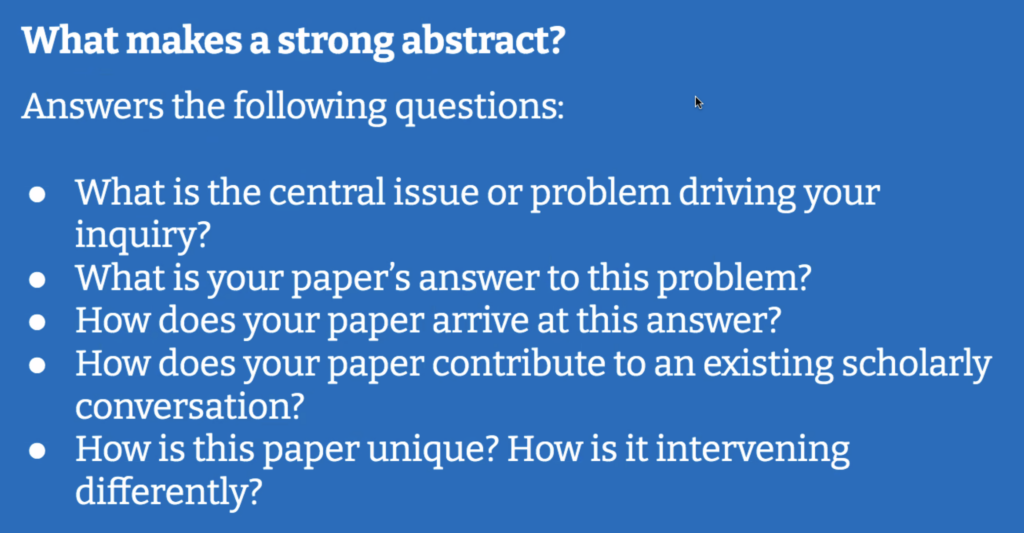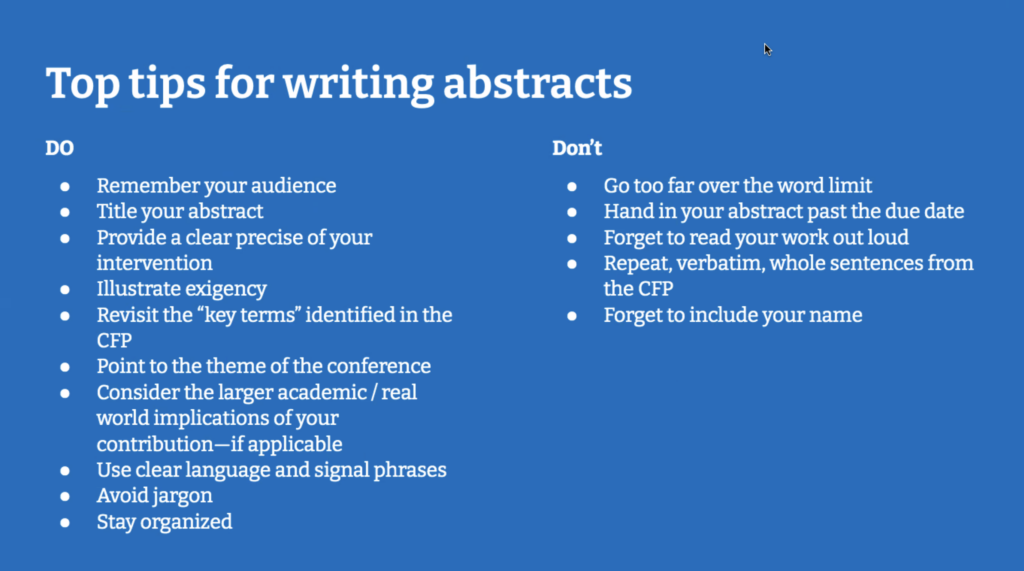A very short preface: My work schedule this semester makes attending the workshops focused on digital skills impossible, so I am especially grateful to all of you for sharing your thorough workshop descriptions! Thank you. Consequently, the workshops I actually CAN attend seem a little further afield. When choosing a session to attend, I am trying to find the sweet spot in the Venn diagram of my availability, my interests, and DH usefulness.
With that in mind: I took a workshop offered by the Gradcenter’s Writing Center (I work at a writing center at another institution) on responding to CFPs (Calls For Proposals or Papers)/ writing a conference abstract.
Overall, the workshop took the mystery out of the CFP process and made me think that any one of us with an idea that aligns with a conference’s theme should dare to go for submitting a proposal (in the form of an abstract).
There are several kinds of conferences: (and you’ve probably seen some asking for proposals in the emails Jason shares with us, most recently HASTAC)
- sponsored by grad schools
- regional
- national (and international)
The two instructors agreed that going to a grad school-sponsored conference might be a great initiating experience.
The bulk of the session was then devoted to looking at dos and don’ts of abstract writing as well as looking at a couple of example abstracts. Below, the essentials.
Your abstract is written in response to a specific conference’s theme. Showing how your idea connects to the theme is vital. The theme is certainly recognizable in the conference’s title, but you might also look for and define the “key terms” the CFP identifies (see second slide) and refer to those terms as you describe your planned contribution. Defining your contribution’s place in the often suggested sub-themes and locating the available formats should also be part of your considerations. Formats might be round tables, panels, seminars, workshops, etc. — they all suggest slightly different approaches to your idea.
Here a concise summary of what an abstract should do (the two images are screenshots of slides from the workshop):

…and all of this in an allotted word limit of 200, 300, 500 words (there is a spectrum, but short is the defining feature).
And here the dos and don’ts, which I think are a useful checklist for your abstract-in-progress:

The presenters also made a point of mentioning that even if you write a great abstract, your proposal might still not be chosen, as there are additional “uncontrollable forces” involved in the selection process. The selection committee has to consider the overall-make-up of a panel or round table, so sometimes, in order to achieve a balance of perspectives and subspecialties, some great proposals might not make it.
From my work as a writing consultant, I’ll add the following:
- Sounds simple, but still: Close read and return to the CFP a few times as you are consolidating and developing your thoughts.
- And: take advantage of the Writing Center and bring them your draft in progress to get an outside reader’s input.
- Also: feel free to contact me with any abstract-related questions anytime.
- …. and please share info about upcoming conferences.




super helpful— thank you for the quick recap! saving the tips and tricks.
Thanks for the summary. This is super helpful!
Thank you so much for this Maria! I’m also “trying to find the sweet spot in the Venn diagram of my availability, my interests, and DH usefulness” when looking for and signing up for workshops. The one you attended and your blog post was super helpful.
I just wanted to say that this image of “the sweet spot in the Venn diagram of my availability, my interests, and DH usefulness” is so powerful and effective! It’s stuck in my head now!